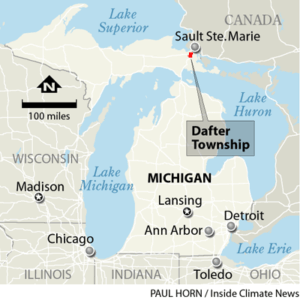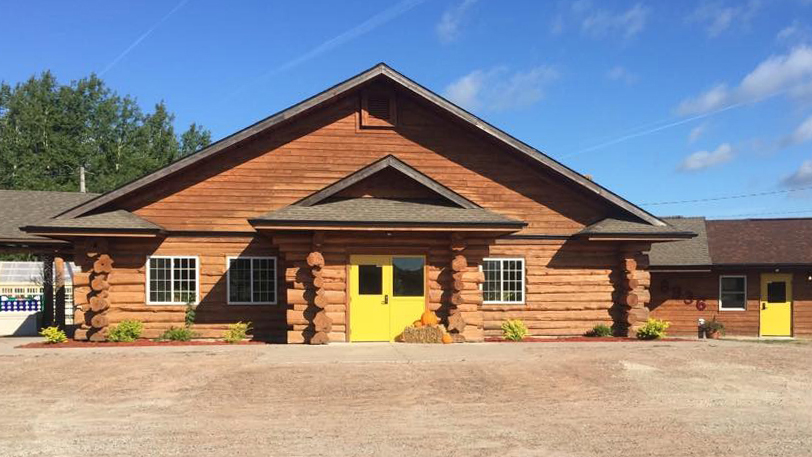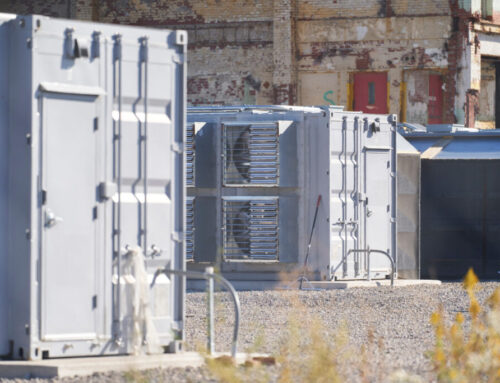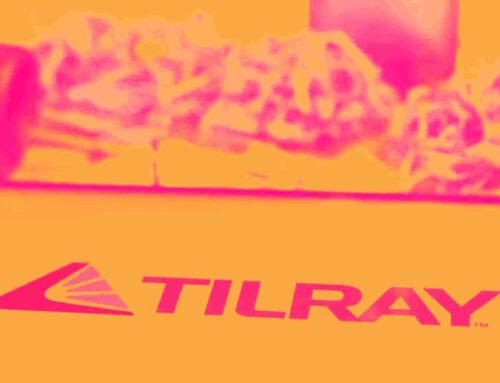A Bitcoin Mine Came to Michigan’s Upper Peninsula, and Dafter Township Isn’t Happy
October 10, 2025
This is the last of three articles about Michigan communities organizing to stop the construction of energy-intensive computing facilities.
A log cabin building surrounded by forest in the expansive wilderness of Michigan’s Upper Peninsula houses the Lake Superior Academy, a school focused on environmental education for its K-5 students.
The Dafter Township property was an ideal setting for its programming, until March, when a bitcoin mining operation came online directly across the street. The mine’s loud, steady hum forced students indoors and disrupted their education, school officials reported. Birds the students once tracked even seemed to be driven off by the din.
“Prior to the bitcoin mine moving in, it was just a beautiful spot for learning,” the school’s director, Susie Schlehuber, told a local news outlet in June. “Our whole school philosophy, everything we were founded on, has been disrupted because of the noise.”
Get Inside Clean Energy
Today’s Climate
Tuesdays
A once-a-week digest of the most pressing climate-related news, written by Kiley Price and released every Tuesday.
Get Today’s Climate
Breaking News
Don’t miss a beat. Get a daily email of our original, groundbreaking stories written by our national network of award-winning reporters.
Get Breaking News
ICN Sunday Morning
Go behind the scenes with executive editor Vernon Loeb and ICN reporters as they discuss one of the week’s top stories.
Get ICN Sunday Morning
Justice & Health
A digest of stories on the inequalities that worsen the impacts of climate change on vulnerable communities.
Get Justice & Health
In July, the school sued and secured a temporary restraining order requiring the mine’s owner, Florida-based Odessa Partners, to shut down as the lawsuit was litigated. The two sides are currently in mediation. Odessa did not respond to a request for comment from Inside Climate News.
The mine has stirred up an ongoing saga that has resulted in the legal battle and drawn outrage from residents who have demanded answers from local leadership about the operation’s energy use, water use, water pollution and impacts on utility rates, among other issues. Bitcoin mines require huge amounts of electricity, and most consume high levels of water to cool their servers.
Some residents are mobilizing to push for more protections against bitcoin mines in municipalities across the Upper Peninsula. A nearby township put a moratorium in place; other municipalities are considering taking action.
The controversy has been a “wake-up call,” said Kalvin Carter, project director for Up North Advocacy, a nonprofit.
“It’s really the wild west with the mines because there are no regulations, it’s just go do it while you can,” Carter said. “A lot of these communities and boards don’t know what a bitcoin is, and it’s hard to regulate something when you don’t know what it is.”
He said he fears data centers, which bring similar problems, will come next if protections aren’t put in place.
Dafter Township, a small town of about 1,300 people just south of Sault Ste. Marie in the eastern Upper Peninsula, is among flashpoints in Michigan in which grassroots campaigns from across the political spectrum have, or may, derail plans for data centers and bitcoin mines.
The Upper Peninsula is attractive to the operations because of its cool climate and abundant access to water, and the Odessa mine is one of three operating in the region.
Carter said many residents were dismayed to learn that the Cloverland Electric Cooperative, which serves much of the Upper Peninsula, has advertised for bitcoin mines and was involved in bringing the Odessa mine to Dafter Township to generate more revenue.

Odessa’s mine is composed of six metal pods housing large computers that constantly run as they solve complex equations to earn bitcoin, which generates profits for Odessa. The pods sit on 10 acres just across the street from the school, and the project’s fans for cooling the equipment are what generates the din.
Sound readings taken on the school property soon after the mine came online exceeded 70 decibels, which is similar to the sound of a vacuum cleaner.
Michigan does not have regulations in place that specifically provide oversight for bitcoin mines, and proposed legislation aims to incentivize the industry’s growth across the state, and would bar state or local governments from banning cryptocurrency.
It is unclear if the bill has enough support to pass, but people in the Upper Peninsula are not waiting on the state to act, said Chloe Kannan, a resident who works with a small group of volunteer residents working on the issue.
“People are starting to see what this is doing to Wisconsin and other communities across the country, and we know we’re on the largest body of freshwater in the world, and we know we’re a target,” Kannan said.
“It Was All Stripes of People”
The mine began operations as Lake Superior Academy reportedly put plans into motion for the addition of two classrooms that could accommodate 40 additional children to its current student body of about 90. For now, those plans are on hold. Despite the disruption, the school put up a Facebook post that read “Bitcoin is cool, but not near a school.”
As news of the problem spread, residents from across the region gathered for a June 5 Dafter Township Planning Commission meeting to look for answers and express opposition, Carter said. “It wasn’t tree-hugging leftists or MAGA people afraid of change—it was all stripes of people,” he said.
Odessa had told the township in planning documents that it would build a storage facility, without mentioning that the company planned to house a bitcoin mine, which Carter said generated distrust.
Residents also grew suspicious because a mine representative who was supposed to answer community questions at the meeting would not say who owned the operation, and would not provide his last name.
Meanwhile, questions and concerns have gone unaddressed, Kannan said. It is still unclear how much water is, or will be, drawn from the aquifer, and whether chemicals that could pose health risks or pollute the groundwater are used for cooling. A proliferation of electricity-guzzling mines could ultimately require more fossil fuels to be used or more infrastructure to be built to meet demands.

Lake Superior Academy’s lawsuit asked a county judge to order a preliminary injunction to shut down the mine, order the noise to be reduced and award at least $25,000 in damages. A judge issued the restraining order, and that day Odessa stacked large hay bales around the mine, which dampened the noise.
Among those at the June 5 meeting was Kristi Autore, whose husband, Shawn Merritt, is on the nearby Clark Township Planning Commission. Autore told Merritt about the problems in Dafter. Within about a month, the Clark Township Planning Commission and Board of Trustees had passed a one-year moratorium on mines while the township develops new rules around the facilities.
Autore said she had read about problems with bitcoin mines and data centers in communities across the country, and there was speculation that mine owners were already looking for parcels in Clark Township. She said she suspects they were looking at the area because “electricity is cheap and the water is free.”
“[Clark Township] put a moratorium in place to give us a cushion and some protection so that what happens and Dafter couldn’t suddenly happen to us,” Autore said. “Why invite someone into your community when it’s only going to make life more expensive?”
Is a Bitcoin Mine Good for Ratepayers?
In March 2023, Cloverland Electric Cooperative Data put a post on its website that got little attention until two years later when the Odessa controversy hit. It announced that the cooperative was attempting to attract energy-hungry bitcoin mines to its service territory so it could boost energy production and revenues.
The Upper Peninsula’s population is decreasing, and with it, so is energy use. The cooperative has said the mine’s steady energy use will help offset maintenance costs that otherwise would fall on residents.
This story is funded by readers like you.
Our nonprofit newsroom provides award-winning climate coverage free of charge and advertising. We rely on donations from readers like you to keep going. Please donate now to support our work.
“Data mining is attractive because when implemented correctly, it can grow electric use, or demand, in a positive way—it has the potential to generate additional revenue through load growth,” the co-op wrote in the 2023 post.
The cooperative’s involvement in bringing “disruptive” bitcoin mines has frustrated some residents, Carter said, and they fear that courting bitcoin mines opens the door for data centers.
A spokesperson for the cooperative did not respond to specific questions from Inside Climate News, and instead pointed to a “data center” FAQ page.
Up to 50 percent of Cloverland’s power comes from hydroelectric, which releases low levels of greenhouse gas, according to the company’s site. It buys the rest of its power from Wisconsin Electric, which uses coal and natural gas to deliver its baseloads. Cloverland has increased its solar production, Carter said, but residents don’t want more solar fields to accommodate bitcoin mines, which are capital-intensive projects that might ultimately negate the purported savings.
“We want to keep our forests and fields and keep the natural beauty, and we don’t want this place being nothing but a solar field,” Carter said.
He added that Cloverland’s rates are already low, so many residents question the need to attract energy-guzzling businesses to keep rates down. Carter said the cooperative largely has not provided clear answers to residents’ questions.
“Cloverland has not been doing a good job reaching out to people and explaining their position, and we love our co-op, so that’s why this hurts doubly,” he said.
While the future is unclear, the issue is bringing together residents in a way that other issues have not, Kannan said.
“There’s a lot of hope here in bringing together in this fight because we know this is not the investment we want,” Kannan said. “We want jobs, we want investment, doctors and lawyers, and an AI data center or bitcoin mines are not going to do that—they’re just going to make people want to leave.”
About This Story
Perhaps you noticed: This story, like all the news we publish, is free to read. That’s because Inside Climate News is a 501c3 nonprofit organization. We do not charge a subscription fee, lock our news behind a paywall, or clutter our website with ads. We make our news on climate and the environment freely available to you and anyone who wants it.
That’s not all. We also share our news for free with scores of other media organizations around the country. Many of them can’t afford to do environmental journalism of their own. We’ve built bureaus from coast to coast to report local stories, collaborate with local newsrooms and co-publish articles so that this vital work is shared as widely as possible.
Two of us launched ICN in 2007. Six years later we earned a Pulitzer Prize for National Reporting, and now we run the oldest and largest dedicated climate newsroom in the nation. We tell the story in all its complexity. We hold polluters accountable. We expose environmental injustice. We debunk misinformation. We scrutinize solutions and inspire action.
Donations from readers like you fund every aspect of what we do. If you don’t already, will you support our ongoing work, our reporting on the biggest crisis facing our planet, and help us reach even more readers in more places?
Please take a moment to make a tax-deductible donation. Every one of them makes a difference.
Thank you,
Search
RECENT PRESS RELEASES
Related Post







